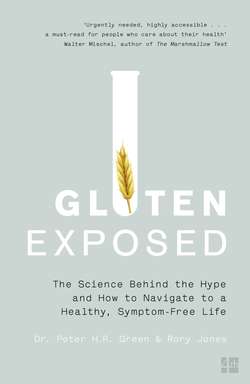Читать книгу Gluten Exposed: The Science Behind the Hype and How to Navigate to a Healthy, Symptom-free Life - Rory Jones, Dr. Green Peter - Страница 11
Listening to the Media and the Masseuse
ОглавлениеMany readers do not go beyond an article’s headline or its opening paragraph; it is also difficult for laymen to critically assess statements coming from apparent voices of authority.
—JEROME GROOPMAN, M.D., HOW DOCTORS THINK
Health advice is readily available on the Internet, TV shows, and from nutritionists or unlicensed “dietitians,” health gurus, masseuses, bloggers, newspapers, and magazines. While the advice from alternative sources can be helpful in some cases and generally ensures a sympathetic ear, it should not be a substitute for or confused with medical advice from your physician.
You Rely on Internet Advice
My patient arrived with a fistful of material from the Internet, a list of tests she wanted to confirm the diagnosis she’d come to of her problem, and possible drugs to treat it. I asked her why she bothered to consult with a doctor.
(DR. F)
There are many medical resources on the Internet, but it can be hard to understand and interpret research studies. PubMed Central, an archive of biomedical and life sciences journal literature at the U.S. National Institutes of Health’s (NIH) National Library of Medicine, posts the abstracts of all research studies (essentially the summary of what the study set out to do and its results and conclusions). While some studies are free, obtaining full-text articles that contain a discussion section is often difficult without academic access and a subscription. This key section outlines all the limitations of the study (e.g., a very small group was tested, requiring confirmation in a larger study; participants dropped out because of symptoms; a drug or test caused serious side effects in a significant amount of people, etc.) that are crucial for assessing its meaning.
Magazine articles often trumpet a study, drug, or breakthrough that comes on the heels of another less-publicized study with opposing or lukewarm results.
Some Listserv sites distribute messages with Q&A sections to a specialized electronic mailing list. The advice on these sites ranges from practical travel and eating-out advice to testing analysis. The former is helpful; the latter is dangerous, as it comes mainly from patients.
Some people rely on the Internet more heavily because it is often financially difficult for them to see a doctor until a medical crisis sends them to the emergency room. Nevertheless, most major medical centers today have excellent websites based on the different specialties and conditions they treat. These specific sites offer reliable medical guidance and can help you determine if a doctor’s visit is essential and help you to find appropriate resources.
Conflicting advice is found online, and many people read articles that agree with what they have already decided is the solution. Many are looking not for medical information but advice and treatments from the articles and “experts” that confirm their own prejudices on the subject.
The Internet offers everything from PubMed Central to preposterous—it is not a place to go for a diagnosis or treatment.
You “Test” Online
Alternative tests for various food intolerances are available online. While the less said about them the better—you are paying a great deal of money for something that is scientifically meaningless—the reasons behind this statement deserve some explanation.
A biological marker for gluten sensitivity does not currently exist, although researchers are working to find one. (See chapter 18, “Gluten Sensitivity.”) Despite that fact, fecal (stool) tests for this condition are available online along with other fecal tests for various food intolerances and allergies. The same “lab” also advertises a DNA genetic test for nonceliac gluten sensitivity (NCGS) even though no specific genes have been isolated for the condition.
Additionally, the markers they claim will determine the “diagnosis” (IgG antigliadin antibodies) are neither sensitive nor specific enough to diagnose either celiac disease or gluten sensitivity. (See chapter 6, “A Word on Testing.”) It has been shown that 20 percent of non-gluten-sensitive individuals also have elevated levels of these antibodies for no apparent reason, which puts any “diagnosis” by these tests in serious doubt.
The danger of getting your medical information and diagnosis from what amounts to a self-test is that your problem may not be gluten sensitivity and you fail to get a proper medical evaluation, thereby missing a serious illness that then goes untreated and may progress.
You Do It “Naturally” with Alternative Sources
Inundated by headlines and articles exposing the dangers in our food supply, the side effects of drugs, the rise in hospital-borne infections, bacterial resistance to antibiotics, and many other environmental dangers, many patients want a more “natural” approach to health care. Others feel that they understand their bodies better than their doctors. While there may be some truth in this thinking, it can also border on the delusional. (See chapter 3, “Picky Eaters.”)
Many people find their thinking about food and fatigue issues is more simpatico with that of a chiropractor, trainer, nutritionist, or acupuncturist and follow their dietary and supplement advice. Some of these practitioners push products that they claim will cure gastrointestinal issues, cleanse the body, and enhance your health, but are usually the modern version of snake oil—a quick quack remedy or panacea. The majority of these products will do little more than help your wallet lose weight, and some of them can be truly dangerous. (See chapter 5, “Supplements and Probiotics.”) This can make patients fearful or unwilling to tell their doctors about the supplements, herbs, and potions they take in addition to prescription medications. The doctor is then unable to unravel a drug/supplement interaction that could be lethal and would be immediately apparent if the patient had come clean.
Doing it “naturally” or on your own can compound issues, especially when there are major problems or psychological issues.
